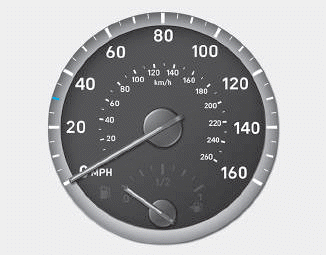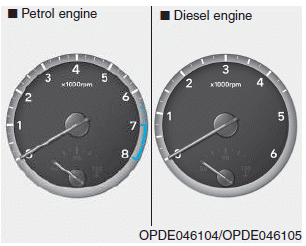Hyundai i-30: Braking system / Anti-lock Brake System (ABS)
WARNING
An Anti-Lock Braking System (ABS) or an Electronic Stability Control (ESC) system will not prevent accidents due to improper or dangerous driving manoeuvres. Even though vehicle control is improved during emergency braking, always maintain a safe distance between you and objects ahead of you. Vehicle speeds should always be reduced during extreme road conditions. The braking distance for vehicles equipped with ABS or ESC may be longer than for those without these systems in the following road conditions.
Drive your vehicle at reduced speeds during the following conditions:
- Rough, gravel or snow-covered roads.
- On roads where the road surface is pitted or has different surface height.
- Tyre chains are installed on your vehicle.
The safety features of an ABS or ESC equipped vehicle should not be tested by high speed driving or cornering. This could endanger the safety of yourself or others.
ABS is an electronic braking system that helps prevent a braking skid. ABS allows the driver to steer and brake at the same time.
Using ABS
To obtain the maximum benefit from your ABS in an emergency situation, do not attempt to modulate your brake pressure and do not try to pump your brakes. Depress your brake pedal as hard as possible.
When you apply your brakes under conditions which may lock the wheels, you may hear sounds from the brakes, or feel a corresponding sensation in the brake pedal. This is normal and it means your ABS is active.
ABS does not reduce the time or distance it takes to stop the vehicle.
Always maintain a safe distance from the vehicle in front of you.
ABS will not prevent a skid that results from sudden changes in direction, such as trying to take a corner too fast or making a sudden lane change. Always drive at a safe speed for the road and weather conditions.
ABS cannot prevent a loss of stability. Always steer moderately when braking hard. Severe or sharp steering wheel movement can still cause your vehicle to veer into oncoming traffic or off the road.
On loose or uneven road surfaces, operation of the anti-lock brake system may result in a longer stopping distance than for vehicles equipped with a conventional brake system.
The ABS warning light ( ) will
stay
on for several seconds after the
Ignition switch is placed in the ON
position. During that time, the ABS
will go through self-diagnosis and the
light will go off if everything is normal.
If the light stays on, you may
have a problem with your ABS. We
recommend that you contact a
HYUNDAI authorised repairer as
soon as possible.
) will
stay
on for several seconds after the
Ignition switch is placed in the ON
position. During that time, the ABS
will go through self-diagnosis and the
light will go off if everything is normal.
If the light stays on, you may
have a problem with your ABS. We
recommend that you contact a
HYUNDAI authorised repairer as
soon as possible.
WARNING
If the ABS warning light ( ) is
on and stays on, you may have
a problem with the ABS. Your
power brakes will work normally.
To reduce the risk of serious
injury or death, we recommend
that you contact your HYUNDAI
dealer as soon as possible.
) is
on and stays on, you may have
a problem with the ABS. Your
power brakes will work normally.
To reduce the risk of serious
injury or death, we recommend
that you contact your HYUNDAI
dealer as soon as possible.
NOTICE
When you drive on a road having
poor traction, such as an icy road,
and apply your brakes continuously,
the ABS will be active continuously
and the ABS warning
light ( ) may illuminate. Pull
your vehicle over to a safe place
and turn the engine off.
) may illuminate. Pull
your vehicle over to a safe place
and turn the engine off.
Restart the engine. If the ABS warning light is off, then your ABS system is normal.
Otherwise, you may have a problem with your ABS system. We recommend that you contact a HYUNDAI authorised repairer as soon as possible.
Information
When you jump start your vehicle
because of a drained battery, the ABS
warning light ( ) may turn on at the
same time. This happens because of
the low battery voltage. It does not
mean your ABS is malfunctioning.
Have the battery recharged before
driving the vehicle.
) may turn on at the
same time. This happens because of
the low battery voltage. It does not
mean your ABS is malfunctioning.
Have the battery recharged before
driving the vehicle.
 Warning messages
Warning messages
Parking brake automatically locked
When the EPB is applied from Auto
Hold, a warning will sound and a
message will appear.
AUTO HOLD deactivating...
 Electronic Stability Control
(ESC)
Electronic Stability Control
(ESC)
The Electronic Stability Control
(ESC) system helps to stabilize the
vehicle during cornering manoeuvres.
ESC checks where you are steering
and where the vehicle is actually
going...
Other information:
Hyundai i30 (PD) 2018-2025 Owner's Manual: Interior lights
NOTICE Do not use the interior lights for extended periods when the engine is turned off otherwise the battery will discharge. WARNING Do not use the interior lights when driving in the dark.The interior lights may obscure your view and cause an accident...
Hyundai i30 (PD) 2018-2025 Service Manual: Specifications
Specifications Front Suspension Item Specification Suspension type Mac Pherson Strut Shock absorber Type Conventional valve Rear Suspension Item Specification Suspension type Torsion Beam Axle Shock absorber Type Monotube Wheel & Tire Item Specification Normal load Maximum load Front Rear Front Rear Wheel Aluminum 6...
Categories
- Manuals Home
- 3rd Generation i30 Owners Manual
- 3rd Generation i30 Service Manual
- Tyre pressure monitoring system
- Trip computer
- Theft-alarm system
- New on site
- Most important about car
Gauges and meters
Speedometer

The speedometer indicates the speed of the vehicle and is calibrated in kilometers per hour (km/h) and/or miles per hour (MPH).
Tachometer

